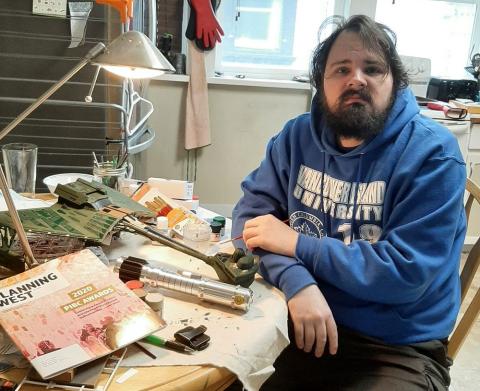Mark Gledhill, a Master of Community Planning student, shares his story.

My name Is Mark Gledhill and I’m a first-year student in the Master of Community Planning program. I also happen to be both a person and a student with some invisible disabilities that affect me every day of my life – being on the Autism Spectrum and having a non-verbal learning disability. At the everyday level my disabilities mean I have difficulty at times with social interaction and reading social cues, but VIU as a whole has always been quite welcoming towards me as a person with a disability. My non-verbal learning can also affect my spelling and grammar but the help from VIU and the understanding that I take extra time helped me earn a Bachelor of Arts in History and Political Science at the undergrad level in 2016. However, as student with a disability it also means that I will be doing the master’s program over three years so that I can get the support I need.
Tell us a little bit about your research/study focus.
I’m hoping to bring my love of heritage together with my understanding of being a person with a disability to create what I hope will be something unique and helpful. While I’m still working out the details, my plan is to do my thesis on designing a list of strategies or steps to improve accessibility in heritage buildings and districts. What most Canadians don’t realize is that many cities are starting to get to the age where many our buildings are becoming designated heritage buildings and need to be protected, but also have to be used by all elements of our society. It is my hope that creating something like this can help bridge the gap between old and new as we move into the next Canadian century.
What do you hope to go on and do for a career?
There is a lack of people with both visible and invisible disabilities in the planning profession and it is my hope that I can help act as voice, identifying barriers in future projects and helping others see that planning might be a good field for them. I also hope to help educate others to think about accessibility in planning not as something extra but as a core value. I firmly believe that the cohort I’m in will come out better prepared to face these issues with me there helping to raise them. While I don’t have a firm idea of where I wish to work yet I do have some aspirations that include trying to create a course or module for the MCP program on accessibility in community/urban planning and writing a book on accessibility in community planning.
What are your hobbies/passions in life?
Outside of my interest in accessibility, I have a host of hobbies/passions in my life. One of the things I have gotten into is the world of cosplay and I have several different cosplay outfits and uniforms that I wear when I go to various conventions. I also belong to The Royal Manticoran Navy: The Official Honor Harrington Fan Association. It re-creates the world of the book series of Honor Harrington. The association has over 6,000 members in 40 countries around the world. Within the association I serve as the Regional Director of Western Canada with the rank of Commodore. My other role is Director of Accessibility for the Bureau of Training, through which I help students with accessibility issues when they are taking exams and review new courses. Lastly, I have also taken up of the hobby of model making and since about March of 2020, I have built and painted around 30 different models focusing mostly on science fiction or WW2 model kits.
How has the COVID-19 pandemic impacted your life or studies or career path? Is there anything you’ve learned during your experience that you’ll carry with you after the pandemic ends?
COVID-19 has impacted my life and studies in a few ways. First the Zoom classes can and do leave me mentally fatigued as much as in-person classes today, which is something I deal with due to my disabilities. However, it has also helped me to realize that I know best how to manage my disabilities and it has given me some insight about going into the work force being open and honest about the challenges I face. I think the biggest thing I learned is to keep being empathic and keep following your passions and interests.




